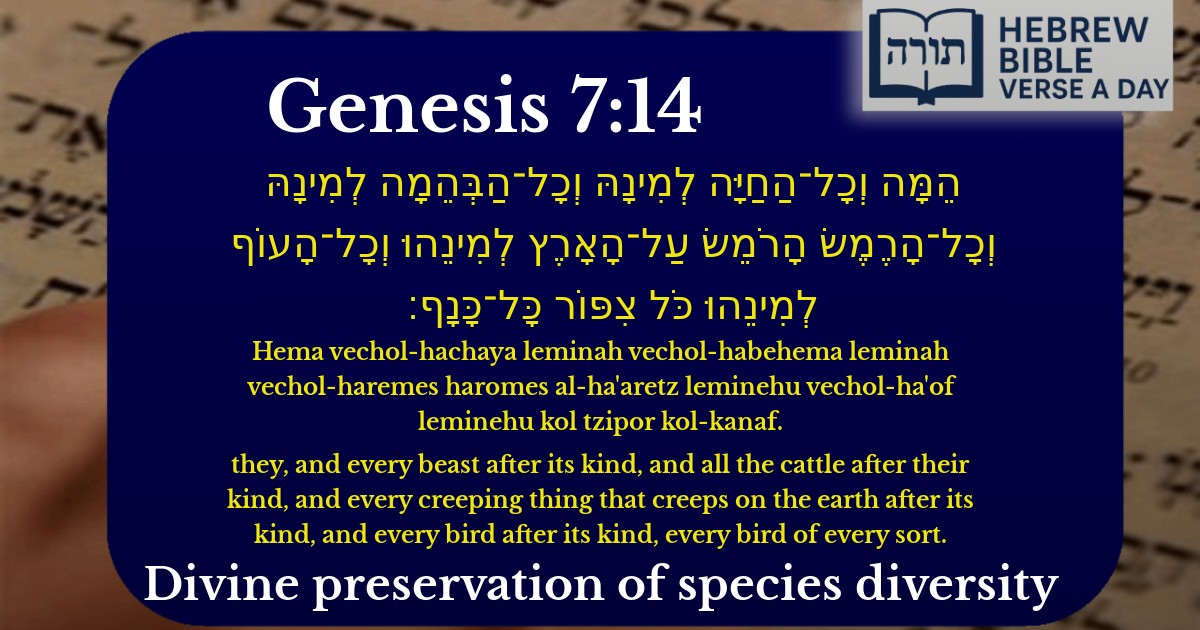Join Our Newsletter To Be Informed When New Videos Are Posted
Join the thousands of fellow Studends who rely on our videos to learn how to read the bible in Hebrew for free!
Hebrew Text
הֵמָּה וְכָל־הַחַיָּה לְמִינָהּ וְכָל־הַבְּהֵמָה לְמִינָהּ וְכָל־הָרֶמֶשׂ הָרֹמֵשׂ עַל־הָאָרֶץ לְמִינֵהוּ וְכָל־הָעוֹף לְמִינֵהוּ כֹּל צִפּוֹר כָּל־כָּנָף׃
English Translation
they, and every beast after its kind, and all the cattle after their kind, and every creeping thing that creeps on the earth after its kind, and every bird after its kind, every bird of every sort.
Transliteration
Hema vechol-hachaya leminah vechol-habehema leminah vechol-haremes haromes al-ha'aretz leminehu vechol-ha'of leminehu kol tzipor kol-kanaf.
Hebrew Leining Text
הֵ֜מָּה וְכׇל־הַֽחַיָּ֣ה לְמִינָ֗הּ וְכׇל־הַבְּהֵמָה֙ לְמִינָ֔הּ וְכׇל־הָרֶ֛מֶשׂ הָרֹמֵ֥שׂ עַל־הָאָ֖רֶץ לְמִינֵ֑הוּ וְכׇל־הָע֣וֹף לְמִינֵ֔הוּ כֹּ֖ל צִפּ֥וֹר כׇּל־כָּנָֽף׃
הֵ֜מָּה וְכׇל־הַֽחַיָּ֣ה לְמִינָ֗הּ וְכׇל־הַבְּהֵמָה֙ לְמִינָ֔הּ וְכׇל־הָרֶ֛מֶשׂ הָרֹמֵ֥שׂ עַל־הָאָ֖רֶץ לְמִינֵ֑הוּ וְכׇל־הָע֣וֹף לְמִינֵ֔הוּ כֹּ֖ל צִפּ֥וֹר כׇּל־כָּנָֽף׃
🎵 Listen to leining
Parasha Commentary
📚 Talmud Citations
This verse is not quoted in the Talmud.


Context in Creation
This verse (Genesis 7:14) describes the entry of animals into Noah's Ark before the flood. The repetition of "לְמִינָהּ" (after its kind) emphasizes that each species was preserved according to its distinct classification, as established during Creation (Genesis 1:21-25). Rashi notes that this phrasing reinforces the principle of min (species), indicating that Hashem ensured the continuity of each creature's unique characteristics.
Preservation of Species
The Rambam (Moreh Nevuchim 3:49) explains that the detailed listing of animals—beasts, cattle, creeping things, and birds—highlights the Divine wisdom in maintaining ecological balance. Each "מִין" (kind) was preserved separately to fulfill its role in the world after the flood. The Midrash (Bereishit Rabbah 28:8) adds that even creatures not typically symbiotic (e.g., predators and prey) coexisted peacefully in the Ark, demonstrating a temporary suspension of natural order for the sake of renewal.
Halachic Implications
Symbolism of Diversity
The Malbim interprets the phrase "כֹּל צִפּוֹר כָּל־כָּנָף" (every bird of every sort) as underscoring the vast diversity within Creation. Even within a single category like birds, Hashem ordained countless variations, reflecting His boundless creativity. This idea is echoed in Pirkei Avot (5:22), which praises the diversity of creatures as a testament to Hashem's greatness.